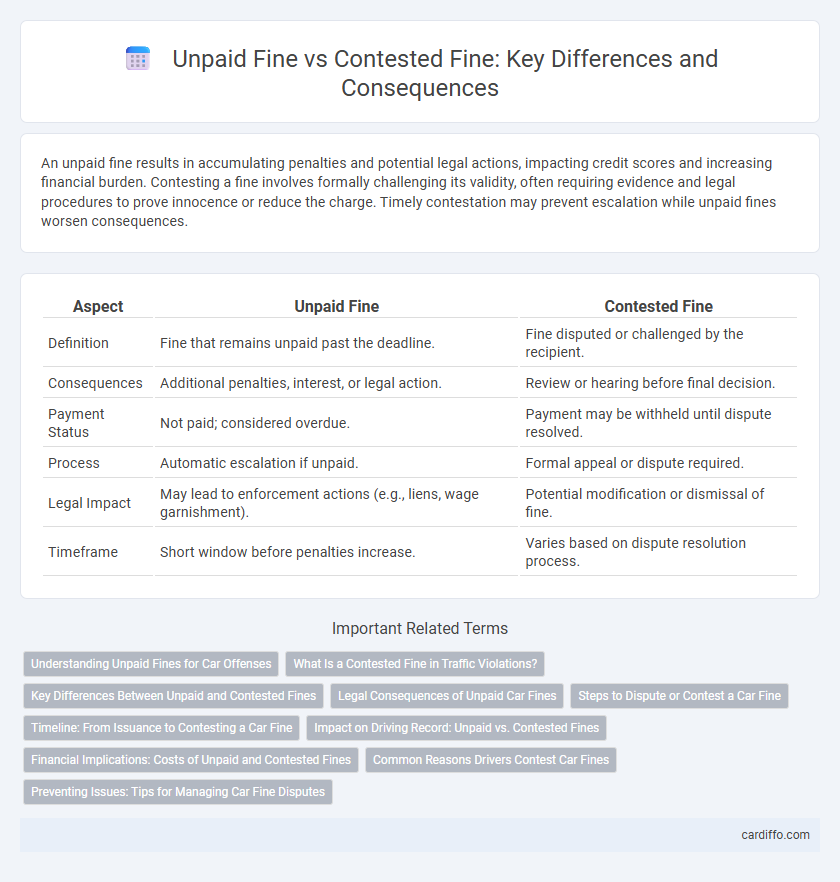An unpaid fine results in accumulating penalties and potential legal actions, impacting credit scores and increasing financial burden. Contesting a fine involves formally challenging its validity, often requiring evidence and legal procedures to prove innocence or reduce the charge. Timely contestation may prevent escalation while unpaid fines worsen consequences.
Table of Comparison
| Aspect | Unpaid Fine | Contested Fine |
|---|---|---|
| Definition | Fine that remains unpaid past the deadline. | Fine disputed or challenged by the recipient. |
| Consequences | Additional penalties, interest, or legal action. | Review or hearing before final decision. |
| Payment Status | Not paid; considered overdue. | Payment may be withheld until dispute resolved. |
| Process | Automatic escalation if unpaid. | Formal appeal or dispute required. |
| Legal Impact | May lead to enforcement actions (e.g., liens, wage garnishment). | Potential modification or dismissal of fine. |
| Timeframe | Short window before penalties increase. | Varies based on dispute resolution process. |
Understanding Unpaid Fines for Car Offenses
Unpaid fines for car offenses can lead to escalating penalties, including increased fees, license suspension, and even vehicle impoundment. Contested fines require a formal dispute process, where evidence and circumstances are reviewed to possibly reduce or dismiss the penalty. Understanding the consequences of unpaid fines helps drivers make informed decisions about timely payment or legal contestation.
What Is a Contested Fine in Traffic Violations?
A contested fine in traffic violations occurs when a driver formally disputes the alleged infraction, often requesting a hearing or submitting evidence to challenge the ticket. This process allows the individual to present their case before a traffic court or authority, potentially resulting in reduced penalties or dismissal if the contest is successful. Unlike unpaid fines, which may lead to additional fees or legal consequences, contested fines involve active participation to resolve the dispute based on the merits of the case.
Key Differences Between Unpaid and Contested Fines
Unpaid fines refer to penalties that remain unsettled past their due date, leading to increased charges or legal consequences, whereas contested fines involve disputing the validity or accuracy of the penalty before payment. Unpaid fines accumulate additional fees and can result in enforcement actions like license suspension or wage garnishment, while contested fines require a formal appeal process, often including hearings or evidence submission. Understanding these distinctions helps individuals choose appropriate steps for resolution, either through payment or legal contestation.
Legal Consequences of Unpaid Car Fines
Unpaid car fines can result in severe legal consequences, including increased penalties, vehicle registration suspension, and potential court summons. Persistent non-payment may lead to license suspension, wage garnishment, or even vehicle impoundment. Contesting a fine within the legal framework can prevent these repercussions by allowing the driver to dispute the charges before escalation.
Steps to Dispute or Contest a Car Fine
To dispute or contest a car fine, first obtain and review the notice of violation to understand the specific charges and deadlines. Gather all relevant evidence, such as photos, witness statements, or receipts, to support your case before submitting a formal dispute request to the issuing authority. Follow the outlined procedure, which may include attending a hearing or providing written explanations, to ensure your contestation is properly evaluated.
Timeline: From Issuance to Contesting a Car Fine
A car fine must be paid within a specific timeframe, typically 14 to 30 days from issuance, to avoid penalties or increased fees. Contesting a fine usually requires submitting an appeal or dispute within this same period, often accompanied by evidence or justification for contesting the charge. Failure to act within the designated timeline often results in the fine becoming unpaid, which may escalate to additional fines or legal action.
Impact on Driving Record: Unpaid vs. Contested Fines
Unpaid fines often result in negative marks on your driving record, including points accumulation and potential license suspension. Contested fines, when successfully challenged, typically prevent added penalties and preserve the clean status of your driving history. Maintaining a dispute process can protect your driving record from long-term damage caused by unresolved fines.
Financial Implications: Costs of Unpaid and Contested Fines
Unpaid fines often result in escalating financial penalties, including late fees and potential interest charges that increase the total cost significantly over time. Contested fines may incur legal expenses and administrative fees, which can surpass the original fine amount if the challenge is prolonged or unsuccessful. Both scenarios can negatively impact credit scores, leading to higher borrowing costs and financial strain for individuals involved.
Common Reasons Drivers Contest Car Fines
Drivers commonly contest car fines due to errors in the issuing process, such as incorrect vehicle details or misidentified infringements. Many also challenge fines citing unclear or inadequate signage, which can lead to unintentional violations. Additionally, disputes over mitigating circumstances, like emergencies or valid permits, frequently motivate drivers to contest unpaid fines.
Preventing Issues: Tips for Managing Car Fine Disputes
Managing car fine disputes effectively requires documenting all communications and gathering evidence such as photos or witness statements to support your case. Promptly responding to fines, whether unpaid or contested, helps avoid additional penalties and legal complications. Understanding the specific procedures for contesting fines in your jurisdiction ensures timely submissions and increases the chances of a favorable outcome.
Unpaid Fine vs Contested Fine Infographic

 cardiffo.com
cardiffo.com